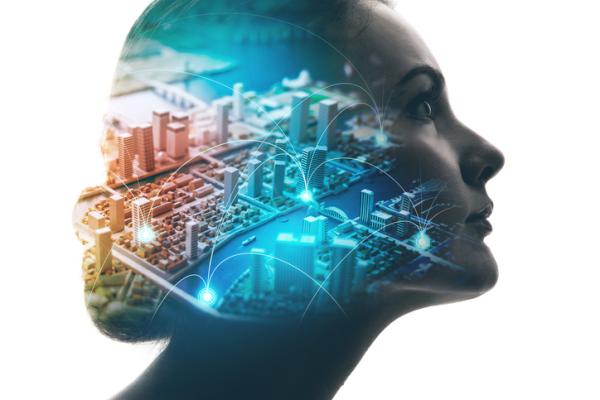
Some of the skills that allow human beings to adapt to the changing environment in which they live are cognitive processes, learning, socialization with other people, among others.
In this sense, there is an aptitude of the human brain that is worth highlighting, as it influences multiple processes of great importance for the adaptation of the human being to the environment, and it is none other than mental flexibility
Below we will see in greater detail what mental flexibility consists of and what its importance is in the adaptation of human beings to various contexts and situations.
What is mental flexibility?
Mental flexibility, also known as cognitive flexibility, is a capacity that the brain has that allows efficiently adjust cognitive processes and behavior in the face of contexts and situations that are novel, unexpected and/or unstable, in order to adapt to the environment and the demands that arise. It could even be said that this faculty is the raison d’être of the brain, since this set of organs have evolved in response to the need to move to survive, and therefore, to be exposed to constantly changing situations.
It should be noted that mental flexibility is a quite complex psychological construct, since it encompasses numerous mental and behavioral processes of the human being and is continually in a dynamic of change and adaptation depending on the environment, situation, culture, stage of the cycle. life in which the person is, etc.
It also offers the ability to restructure our previous knowledge, while assimilating new learning in order to be able to adapt to demands that are constantly changing and/or solve various problems or unknowns.
On the other hand, mental or cognitive flexibility also allows people to work on various tasks in parallel or throughout a successive process, all without the brain becoming overloaded and without interference between one task and another, which allows Complete all tasks successfully.
Main characteristics of mental flexibility
Mental flexibility is closely related to fluid intelligence and, therefore, influences fluid reasoning and the capabilities of human beings when it comes to solving various novel problems that may arise in a flexible and effective way.
In this sense, mental flexibility is one of the superior cognitive abilities of metacognition, and, as such, it influences various cognitive processes such as behavioral control, knowledge, awareness and learning, among others. A person’s knowledge of his or her own capacity within these cognitive processes It allows you to more efficiently control your skills and knowledge to be able to act in a voluntary and controlled manner in order to promote your own learning, and thus your own advancement and improvement in different areas.

Another characteristic is that mental flexibility influences executive functions, so it is very relevant in learning and, therefore, affects development throughout life, as well as academic and work success. This is because mental flexibility allows people to make plans, establish goals and objectives, get started with previously established plans, value their own actions throughout the entire process, as well as learn from mistakes and correct them. and prevent them from happening again.
What benefits does mental flexibility provide?
Mental flexibility also allows people take into account other values, beliefs and ideas, that is, other ways of thinking that others have and at the same time understanding other points of view, respecting whether they are different from one’s own, being able to value other perspectives and options in addition to the one one previously had. This is why mental flexibility is closely associated with empathy, which facilitates and at the same time improves the capacity of human beings in their social interactions with others.
When practicing Mindfulness, mental flexibility offers the possibility of implementing all the mental skills necessary to pay full attention to the present moment, so that the person is focused on all the nuances of the here and now, which that better adaptation to certain contexts and circumstances can be facilitated. For it it is necessary to have an attitude of openness to experience and act without judging anything. As previously mentioned, mental flexibility is that it offers the human being the possibility of adapting quickly to changes or novelties that arise in the environment, which makes it possible to change behavior at the moment depending on the demands of the environment. context and also anticipate possible errors or negative consequences in order to avoid them or, at least, learn from them to avoid their repetition.
On the other hand, this mental flexibility helps people tolerate changes that may arise during a task and thus generate more effective alternatives. It makes us leave behind the idea that life has a script for us and that if we leave it we no longer have any chance of prospering or being happy.
Correct mental flexibility, which has been sufficiently trained through practice in tasks that demand sufficient cognitive work so that the brain is exercised in it, It will make it easier for the person to efficiently make the transition from one task to another sequentially without one interfering with the other, as well as allowing the possibility of performing two tasks simultaneously without losing concentration and completing both successfully.
Its importance in crisis situations
In difficult times, such as those experienced by the global pandemic caused by the coronavirus, properly developed mental flexibility is a fundamental tool to get ahead and cope in the best way possible with suffering and emotional discomfort
On the contrary, mental inflexibility can worsen the problems that were dragging on from before a period of crisis, so this situation of uncertainty to which it is difficult to adapt gives rise to problems of many types.
Mental flexibility is closely related to resilience, a concept that in Psychology refers to the capacity of the human being to face adversity through thoughts and behaviors that enable adaptation. To do this, you must take perspective, contemplating all the alternatives to the possibilities that are within reach and implement a series of behaviors that are aimed at the objectives that allow you to move forward in these difficult situations and even come out stronger for a future in which Similar situations could arise.
Tips to train and promote mental flexibility
It could give the impression that this ability is something innate and that it cannot be changed through learning; However, this does not correspond to reality. The truth is that it is possible to enhance and grow mental flexibility, although in the same way, there are certain habits and lifestyles that atrophy it. Therefore, it is recommended that when structuring our routines, we also take into account that we must be able to provide ourselves with psychologically enriching experiences.
Some of the tips that may be useful to train mental flexibility are the following:








